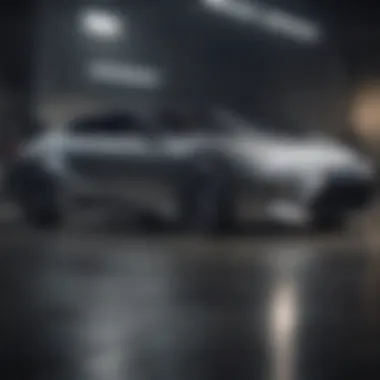Lexus Electric Vehicles: Current Offerings and Future Prospects


Intro
As the automotive world steers more towards electrification, Lexus is not sitting back, watching the tide go in and out. They are firmly stepping in to explore electric vehicles, carving out a niche that speaks to both performance and luxury. The transition into electric mobility is a big leap for any traditional carmaker, but Lexus has been laying down the groundwork for years. This pivot raises critical questions about their roadmap, technological advancements, and how they stack up against both legacy brands and emerging players in the electric vehicle market.
With a wide array of choices now available, from sleek sedans to robust crossovers, consumers are often left to decipher which model matches their needs. Will a Lexus still provide that luxurious feel when packed with batteries rather than a traditional engine? This article aims to navigate through the maze of Lexus's electric offerings, focusing on the key aspects that make them stand out in the current automotive landscape.
Prelude to Lexus Electric Vehicles
Lexus is stepping onto the electric vehicle stage, and this move is more than just a trend; it’s a pivot towards the future. As consumers become increasingly conscious of their carbon footprints, the automotive industry stands at a crossroads. This section discusses why Lexus's electric offerings could be pivotal in shaping the future of driving, sustainability, and performance.
Seeing Lexus dive into electric mobility underlines the growing importance of energy-efficient options. Consumers today want vehicles that not only perform but also align with their values. As they choose how to invest in transportation for both practicality and conscience, Lexus’s electric offerings serve as a vital piece of that puzzle.
The Shift Towards Electrification
The shift to electric vehicles isn’t just a phase—it’s a response to changing times. Automakers must adapt or risk being left behind. For Lexus, the movement toward electrification is manifested as a commitment to developing a portfolio of electric vehicles that address both performance and sustainability. This transition is not only about switching from gas to electric; it’s a whole new approach to design, engineering, and consumer engagement.
On one hand, there is the push toward government mandates and regulations that aim to reduce emissions. On the other, luxury buyers are specifically looking for cleaner alternatives without sacrificing style or performance. Lexus appears ready to embrace this change, encouraging its loyal consumer base to transition while also attracting new customers who seek advanced, eco-friendly vehicles. As we look at the specs and features down the line, it’s crucial to recognize that this is only the beginning of a monumental shift in how Lexus and the automotive world function.
Lexus's Commitment to Sustainability
Speaking of go-green efforts, Lexus seems to truly walk the walk when it comes to sustainability. Beyond just producing electric vehicles, the brand is embedding environmental considerations into every facet of its business model. From sustainable sourcing of materials to energy-efficient manufacturing processes, Lexus is taking a holistic approach to reducing its ecological impact.
Many consumers these days appreciate transparency in how their goods are made and the potential effect on the planet. Wrapped up in this movement are practical advantages, such as fuel efficiency and lower operating costs, that come with owning an electric vehicle.
"A cleaner ride isn’t just a dream anymore; it’s well within reach with Lexus’s forward-thinking strategies."
This commitment isn't just a marketing gimmick but a central theme in Lexus's operational ethos. They aim to resonate with drivers looking for a luxurious yet responsible driving experience. By blending innovation with sustainability, Lexus endeavors to not only attract customers but to redefine what luxury means in the automotive space.
Thus, as the electrification of vehicles proceeds, consumers can expect Lexus to maintain its stronghold as a luxury brand while navigating this transition. Be it through joint ventures in battery technologies or developing charging infrastructure, Lexus is poised to ensure that electric vehicle ownership is attainable and enticing. This might just change the mantra of the car industry for years to come.
Lexus's Current Electric Vehicle Models
The rise of electric vehicles has molded the automotive landscape into something profoundly different, and Lexus aims to leave its mark on this transformation. Understanding Lexus's current electric vehicle models allows one to grasp how the brand integrates luxury with forward-thinking technology. Moreover, it reveals how Lexus aligns itself with contemporary consumer values, especially those derived from sustainability and innovation.
Overview of Available Models
As of recent years, Lexus has introduced several electric models that cater to diverse preferences and lifestyles. The flagship model, the Lexus RZ, leads the charge. This electric SUV is touted for its harmonious blend of luxury and performance. On the flip side, the Lexus UX 300e stands as a practical option for urban dwellers who prefer compact dimensions without entirely compromising on space.
In addition to these models, one should not overlook the potential of upcoming options such as the planned NX Electric. This anticipated model is expected to further broaden Lexus's appeal in the EV market.
Key Features and Specifications
Stepping into a Lexus EV is akin to a journey where luxury meets technology. Taking the RZ as a prime example, it showcases several standout features:
- Performance: Equipped with dual electric motors, the RZ delivers robust torque, translating into exhilarating acceleration—apt for anyone seeking thrill behind the wheel.
- Range: Generating approximately 250 miles on a single charge, Lexus ensures that practicality is not sacrificed in the name of luxury.
- Interior Comfort: The spacious cabin comes loaded with high-quality materials and sophisticated infotainment technology, elevating the driving experience.


When discussing the UX 300e, its smaller stature does not keep it from impressing. It’s designed for easy navigation through busy streets, yet packed with similar comfort features as its larger sibling.
Pricing and Variants
Understanding the costs associated with Lexus's electric offerings takes on added significance for potential buyers. The pricing for the Lexus RZ starts around $60,000, which reflects its luxury status. Conversely, the UX 300e is priced more accessibly, generally below $50,000, making it a pragmatic choice in Lexus’s lineup.
In terms of variants, Lexus has begun to diversify options. The RZ, for instance, offers different trims, catering to those who seek either heightened performance or added luxury touches.
Ultimately, evaluating these models, their specifications, features, and pricing paints a nuanced picture for prospective buyers. It’s not just about staying ahead of the curve; it’s about riding the wave of change in a way that remains timeless.
Technology Behind Lexus Electric Vehicles
The realm of electric vehicles, or EVs, is burgeoning with advancements that fundamentally alter how we think about mobility. For Lexus, the focus on innovative technology is not just a strategy; it's a necessity in a fiercely competitive landscape. Understanding the technology behind Lexus's electric venture gives a clearer picture of their commitment to quality, sustainability, and efficiency.
Battery Technologies
When we talk about electric vehicles, the heart of the matter is the battery. Lexus employs cutting-edge lithium-ion battery technology designed for sustainability and performance. These batteries offer high energy density, which means they can store more energy in a relatively smaller size. A typical Lexus electric vehicle can have a battery pack that delivers a range of several hundred kilometers on a single charge.
The specific design of the battery system allows for quick charging times, making it convenient for users who may not have the luxury of long charging periods. With every iteration, Lexus aim to enhance the thermal management of these batteries, preventing overheating and extending battery life. This is crucial, as reliability becomes a key deciding factor for consumers considering their initial leap into EV technology.
Charging Infrastructure
An EV's potential is heavily reliant on the charging infrastructure surrounding it. Lexus recognizes this and is working closely with various stakeholders to ensure adeqquate charging stations are readily available.
- Home Charging Options: Many buyers prefer the option of home charging units that can be installed in garages. These chargers allow users to plug in overnight and wake up with a full battery, eliminating the anxiety often associated with running out of power.
- Public Charging Stations: Lexus also collaborates with network providers to expand public charging options. Numerous fast-charging stations are available along major highways, facilitating longer road trips without worrying about charging time.
As infrastructure continues to expand, it's positioned to reduce barriers for consumers who might currently be hesitant about switching from traditional fuel options.
Innovative Features Employed
Beyond just the fundamental aspects of battery and charging, Lexus integrates innovative features that set their electric vehicles apart. Some noteworthy tech include:
- Regenerative Braking: This system recovers energy normally lost during braking and uses it to recharge the battery, effectively increasing the car's range.
- Smart Climate Control: This is designed to manage energy consumption, adjusting the cabin environment without draining the battery significantly.
- Connected Technology: Many Lexus EVs are equipped with cutting-edge infotainment systems that provide drivers with real-time information regarding charging station availability, driving habits, and battery health.
These features not only enhance the user experience but also serve to educate consumers about their vehicle's capabilities, ultimately helping them make informed choices.
"Incorporating advanced technology into Lexus electric vehicles isn't just about performance, it's about reshaping the future of driving for entirely new generations of consumers."
Future Electric Vehicle Plans for Lexus
As Lexus looks toward the horizon of the automotive landscape, its future electric vehicle plans loom large. The importance of this topic cannot be overstated. In a world that is rapidly embracing electrification, Lexus’s strategies will not only define its position but also shape consumer perceptions about luxury electric vehicles. This section delves into the critical elements of their strategy, focusing on upcoming models and the overarching market positioning that Lexus aims to achieve in an increasingly competitive environment.
Upcoming Models and Releases
Lexus is gearing up for an exciting fleet of electric vehicles that are slated to hit the market soon. The anticipation surrounds several upcoming models, each designed with both innovation and luxury in mind. Among the most talked-about is the Lexus LF-Z Electrified. This vehicle is not just an electric SUV; it's a promise of what’s to come. With a range anticipated to exceed 300 miles, this model embraces the brand’s commitment to sustainability while also prioritizing performance.
In addition to the LF-Z, rumors are stirring of a compact electric vehicle aimed at urban consumers. Compact, yet rich in features, this model would cater to a younger audience, blending eco-consciousness with tech-savvy amenities. Lexus appears determined to strike a balance between luxurious appeal and everyday practicality. The planned release schedule for these models is ambitious, suggesting that Lexus is ready to leapfrog into the future, faster than many may have expected.


Market Positioning Strategy
To sustain its reputation, Lexus has devised a market positioning strategy that focuses on not just being another player in the EV space but rather standing out as a symbol of luxury and sophistication. The brand aims to carve its own niche by emphasizing performance, comfort, and cutting-edge technology that enhances the driving experience.
In an age where competition in the electric segment is fierce, Lexus’s strategy hinges on differentiation. This means attracting consumers who are not only looking for sustainability but also insist on quality, technology, and prestige. A major part of their approach includes:
- Targeted Advertising: Tailoring messages to highlight the luxurious aspects of their electric offerings, appealing primarily to affluent customers.
- Innovative Technology: Integrating advanced safety features and in-car connectivity that is intuitive, catering to a market that is tech-savvy.
- Sustainability: Communicating a commitment to eco-friendliness that goes beyond just electric vehicles, including sustainable manufacturing practices.
"It's not just about building electric cars; it's about crafting experiences that embody the essence of luxury while respecting our planet."
With these strategies, Lexus seeks to position itself as a leader in the luxury electric vehicle sector, proving that sustainability doesn't have to come at the expense of performance or luxury. As Lexus charges forward, it will be intriguing to observe how these plans unfold and what they mean for the landscape of electric vehicles at large.
Lexus in Comparison to Competitors
When looking at the electric vehicle landscape, it’s essential to consider how Lexus stacks up against its competitors. The shift towards electric mobility is not merely a trend; it's a paradigm shift in the automotive industry that requires brands to find their niche among a sea of options. Lexus, with its rich history of luxury and innovation, faces the challenge of distinguishing itself in a marketplace crowded with formidable rivals. This section delves into the comparative features, market strategies, and performance aspects of Lexus relative to its key competitors.
Analysis of Key Rivals
Lexus competes with notable brands such as Tesla, BMW, and Audi in the EV segment. Each of these rivals has carved out a specific reputation that influences consumer choices.
- Tesla: Known for its cutting-edge battery technology and vast charging network, Tesla has become synonymous with electric vehicles. Their focus on long-range capabilities and autonomous driving features sets a gold standard that Lexus aims to meet.
- BMW: With the introduction of models like the BMW iX and i4, the German automaker emphasizes performance alongside sustainability. BMW’s wine-styled approach to luxury car manufacturing means Lexus needs to push its boundaries to compete on both innovation and driving pleasure.
- Audi: Audi positions its electric vehicles as a fusion of cutting-edge technology and luxurious comfort. The e-tron series showcases high performance integrated with advanced driver assistance features. Lexus needs to highlight its unique value proposition to draw customers from established brands like Audi, which maintain strong brand loyalty.
Each rival brings its strengths into the arena, requiring Lexus to be agile and innovative to maintain its foothold in the market.
Performance Metrics Comparison
To evaluate the standing of Lexus within the EV market, performance metrics provide a clear indication of how well it holds up against competitors. Observing elements like range, horsepower, and charging efficiency reveals insights into whether Lexus can keep pace or even outshine others.
- Range: In a world where consumers are increasingly concerned about range anxiety, models such as the Lexus RZ 450e need to demonstrate competitive mileage. While Tesla’s Model Y offers upwards of 330 miles on a single charge, Lexus’s mission is to strive for comparable numbers to keep potential buyers interested.
- Acceleration: Luxury vehicles also rely on impressive acceleration statistics to attract enthusiasts. Tesla's Model S has garnered attention for its record-breaking 0-60 mph times, whereas Lexus must ensure its models can provide a thrilling drive that satisfies the average consumer while aligning with the brand's luxury ethos.
- Charging Time: The ease of charging plays a crucial role in consumer decisions. Lexus should examine its charging solutions compared to fast-charging networks available from companies such as Electrify America that cater to Tesla. Efficient charging times can greatly sway buyer sentiment in choosing an EV.
"In electric vehicles, it's not just about what you have; it's about how fast you can get it ready for the road again."
While Lexus has made strides in its electric vehicle offerings, there remains a mountainous path to carve an unforgettable niche. As the competition continues to evolve, keeping an eye on rivals' advancements will provide insight into potential areas for growth and innovation within Lexus's electric future.
Consumer Perspectives on Lexus Electric Vehicles
Understanding consumer perspectives on Lexus's electric vehicles is a crucial aspect of this discussion. It sheds light on how potential buyers and existing customers perceive the brand in the electric vehicle (EV) space. The automotive industry is undergoing a significant transformation, with more consumers becoming environmentally conscious and looking for sustainable options. Thus, grasping what drives consumer decisions can help Lexus tailor its offerings and marketing strategies effectively.
Target Audience Insights
Lexus generally attracts a specific kind of buyer, often characterized by a preference for luxury, reliability, and cutting-edge technology. However, as the market for EVs grows, this audience is evolving. Firstly, the demographic interested in Lexus's electric offerings crosses several boundaries, including tech-savvy millennials and professionals who prioritize sustainability alongside luxury.
- Tech Enthusiasts: These individuals desire the latest technological innovations, including advanced navigation and smart safety features. They often prefer brands that offer state-of-the-art capabilities.
- Eco-Conscious Buyers: With a surge in awareness of climate change, many consumers are shifting toward brands that align with their values of sustainability. Lexus’s commitment to electric vehicles positions it favorably within this segment.
- Luxury Vehicle Buyers: Traditional Lexus consumers, who have always appreciated the brand's focus on luxury, might be hesitant but are curious about how electric vehicles can match the luxurious experience they expect.
Lexus’s ability to cater to varying preferences—be it enhanced technology, environmental responsibility, or luxury— is key to appealing to its target audience.


Feedback and Reception
Consumer feedback plays an instrumental role in shaping Lexus's electric vehicle strategies. Initial reactions to Lexus’s electric models often reflect a blend of excitement and skepticism. The anticipation surrounding the brand’s entry into the electric market is palpable, but some consumers express concerns about performance, range, and charging infrastructure. Key areas of feedback include:
- Performance Concerns: Some potential buyers wonder if electric Lexus vehicles can deliver the same performance and driving experience as their gasoline counterparts. Performance metrics, such as acceleration and handling dynamics, are critical for those who prioritize a spirited driving experience.
- Range Anxiety: For many consumers, one consistent worry revolves around the driving range of electric vehicles. Lexus needs to dispel fears related to running out of charge during longer trips.
- Charging Infrastructure: The availability and convenience of charging stations are essential for adoption. Consumers often look for reassurance regarding charging options, preferably those compatible with home installations.
- Brand Loyalty: Lexus has built a strong reputation for quality and luxury over the years. Previous Lexus owners may feel more inclined to trust the brand's electric offerings, given their positive experiences with traditional models.
Consumers will be increasingly influenced by their experiences as they weigh their next vehicle purchase—whether it be an electric model or not—highlighting the critical nature of ongoing feedback collection for Lexus.
Challenges Faced by Lexus in the EV Market
The shift toward electric vehicles is like a tidal wave swallowing the automotive world. Lexus, a brand known for its luxury and performance, is not immune to these currents. In fact, the journey toward a full electric lineup presents unique challenges that require innovative solutions and strategic foresight. Understanding these challenges is vital not only for Lexus’s success but also for consumers looking to invest in reliable, eco-friendly vehicles.
Supply Chain Considerations
When you think about electric vehicles, the first thing that often comes to mind is the battery. But behind these sleek innovations lies a tangled web of supply chain issues. The batteries used in Lexus's electric vehicles are crafted from rare minerals like lithium and cobalt. Sourcing these materials has become increasingly complex due to geopolitical tensions and environmental concerns.
Moreover, competition for these resources has intensified, as every automaker pushes to secure their own supply chains. Lexus must navigate these waters carefully to avoid disruptions. Recent events, such as the pandemic, have only amplified these complications. Disruptions in manufacturing or delays in sourcing critical materials can slow down production, affecting overall profitability and market positioning.
This means Lexus has to not only ensure a consistent flow of raw materials but also invest in sustainable sourcing practices. They are looking into partnerships with ethicallly-minded suppliers, as consumers today are keen on knowing where their products come from. An example of this is how Tesla has openly collaborated with suppliers to ensure transparency in their supply chains.
"The success of electric vehicles hinges on a robust supply chain. If the foundations are shaky, the entire structure risks collapse."
Consumer Adoption Rates
Even with state-of-the-art technology and impressive vehicles rolling off the production line, there’s an age-old challenge that persists: consumer adoption. A sleek design and advanced features won’t mean much if potential buyers are hesitant about making the leap.
Lexus faces a dual challenge here. First, there's the consumer perception surrounding electric vehicles. Many people still harbor doubts regarding battery life, charging accessibility, and long-term reliability. Simply put, folks want to know if they can rely on an electric Lexus in the same way they would a traditional gasoline-powered car. For instance, if a driver has to plan their trips around charging stations, they may think twice about purchase.
Second, Lexus has to contend with the emotional component of car ownership. Many enthusiasts relish the feel of a roaring engine. Replacing that thrill with silence can be a tough sell.
Efforts to educate consumers about the benefits of electric vehicles are pivotal. This includes not just the environmental advantages but also performance metrics that rival traditional cars. Lexus is employing strategies like hosting test drive events and informational workshops, aiming to dispel myths while showcasing their electric lineup in action.
End: The Path Forward for Lexus and EVs
As we draw the curtain on the exploration of Lexus's electric vehicle journey, it's clear that the pathway ahead is both promising and nuanced. The automotive industry is steering towards a future dominated by electrification, and Lexus, with its rich legacy of quality and innovation, stands at a crucial crossroads. Understanding this conclusion involves recognizing the significance of sustainable practices, advancing technology, and evolving consumer expectations.
Long-Term Industry Trends
The landscape of the automotive sector is changing at dizzying speeds. Several long-term trends are emerging that will heavily influence Lexus—and indeed the entire industry—as it forges its electric path:
- Decarbonization Commitments: As global attention is split between economic recovery and climate action, automakers are increasingly committing to net-zero emissions targets. This means that Lexus must not only deliver electric vehicles but ensure their production processes are sustainable.
- Increasing Demand for Electric Vehicles: Consumers are becoming more inclined to switch to electric vehicles, driven by incentives, environmental awareness, and the evolution of technology. Lexus needs to ensure that it captures this growing market segment with compelling offerings.
- Technological Advancements: With companies like Tesla pushing the boundaries, innovation in battery efficiency, autonomous driving, and connectivity features will be paramount. Lexus's ability to stay ahead hinges on its investment into R&D.
"The future of driving isn't just electric; it's intelligent and interconnected."
- Evolving Customer Preferences: Today's buyers are not just looking for functional vehicles; they desire an experience. Such expectations mean that Lexus should focus on both performance and lifestyle benefits in their electric offerings.
By grasping these trends, Lexus has the opportunity to not just keep pace with competitors but establish itself as a leader in the electric vehicle domain.
Final Thoughts on Lexus's Electric Future
The road ahead for Lexus in the EV sector is filled with both challenges and potential rewards. There are a few key reflections to consider:
- Brand Transition: Traditionally known for luxury sedans and hybrid models, Lexus will need to strategically pivot. This transitions its brand identity towards a more electric-centric image, which may involve redefining what luxury means in the context of ecologically-sensitive vehicles.
- Consumer Education: As buyers contemplate moving from gasoline-powered cars to electric vehicles, understanding the benefits of EVs becomes crucial. Lexus should consider educational campaigns to demystify electric technology and highlight the advantages of their electric models.
- Competitive Positioning: The competition is fierce, and companies like BMW, Audi, and, of course, Tesla, are already entrenched in the market. Lexus should watch closely but also boldly carve out a niche for itself by emphasizing its unique value propositions—including reliability and luxury service standards.















